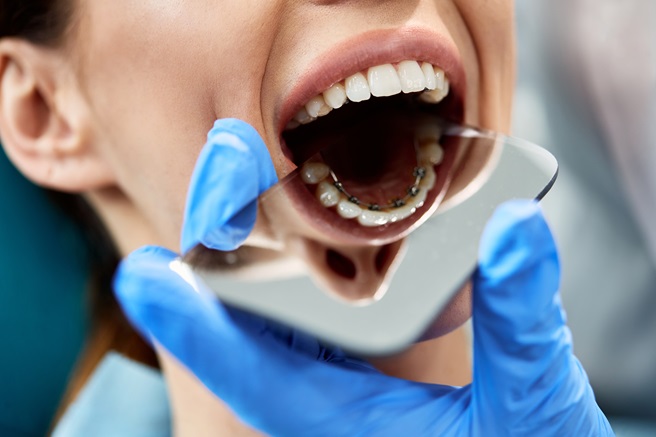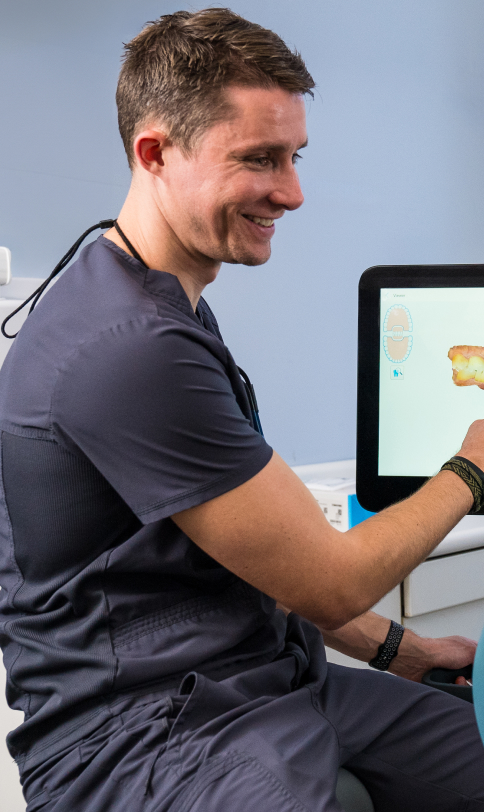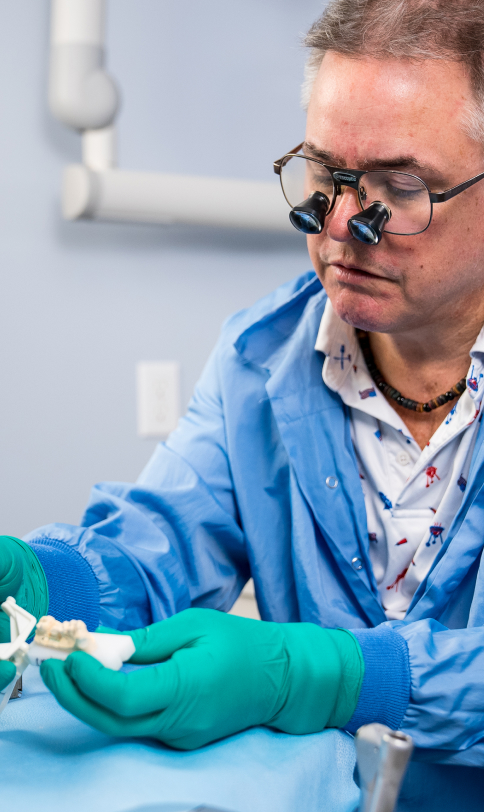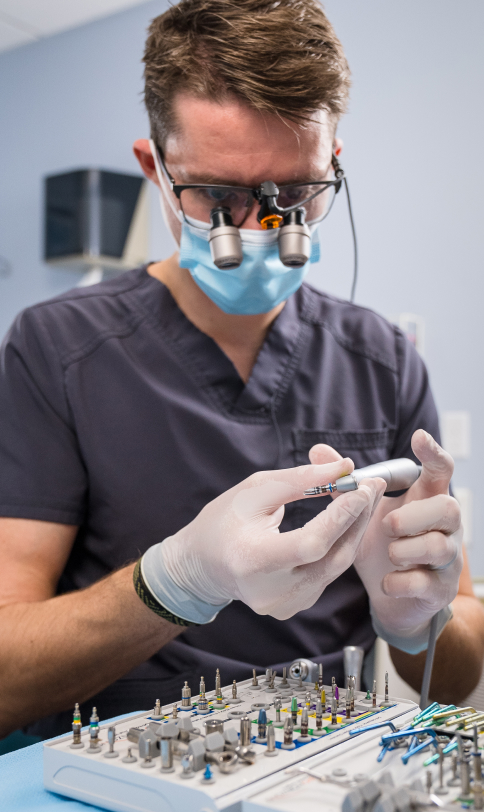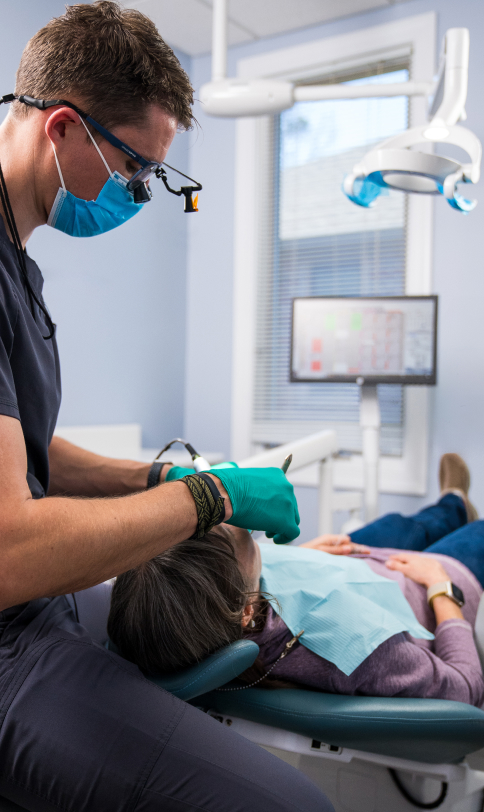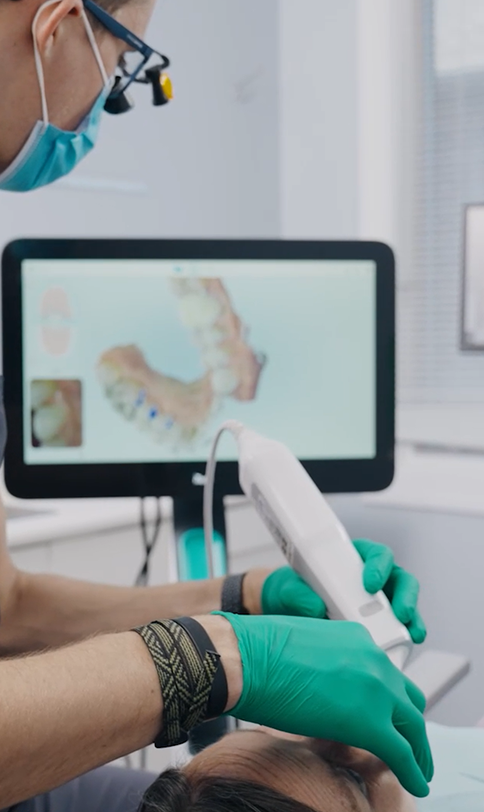
Caring for Your Teeth Before, During & After Invisalign
By Legacy Dental
Invisalign offers a discreet and effective way to straighten teeth, but maintaining oral health during and after treatment requires diligent care. Here’s how to ensure your smile stays healthy and beautiful throughout your Invisalign journey.
The Importance of Oral Hygiene During Invisalign Treatment
Maintaining good oral hygiene is crucial when using Invisalign. The aligners are removable, making it easier to brush and floss compared to traditional braces, they also require additional care to prevent issues like tooth decay and bad breath.
Brush and Floss Regularly
Brushing and flossing after every meal is essential. Food particles can easily get trapped between your teeth and the aligners, creating a breeding ground for bacteria. Use fluoride toothpaste and a soft-bristle toothbrush to clean your teeth thoroughly. Don’t forget to floss daily to remove debris between your teeth.
Clean Your Aligners Daily
Your Invisalign aligners need to be cleaned daily to prevent bacteria buildup. Rinse them with lukewarm water and brush them gently with a soft toothbrush. Avoid using toothpaste, as it can be abrasive and create micro-scratches where bacteria can thrive. Unique cleaning solutions or Invisalign cleaning crystals are ideal for keeping your aligners clear and odor-free.
Eating and Drinking with Invisalign
One of the benefits of Invisalign is the freedom to eat your favorite foods without restrictions. However, certain precautions are necessary to protect your aligners and teeth.
Remove Aligners When Eating
Permanently remove your aligners before eating or drinking anything other than water. Eating with your aligners on can damage them and cause food particles to get trapped, leading to plaque buildup and tooth decay.
Avoid Sugary and Acidic Beverages
Sugary and acidic beverages can erode tooth enamel and increase the risk of cavities. If you consume these drinks, brush your teeth before putting your aligners back in.
Stay Hydrated
Drinking plenty of water helps wash away food particles and bacteria, keeps your mouth clean, and reduces the risk of dry mouth, which can lead to bad breath and other oral health issues.
Managing Discomfort and Oral Health Issues
It’s normal to experience discomfort when you first start wearing Invisalign or switch to a new set of aligners. Here are some tips to manage it effectively:
Use Orthodontic Wax
If the edges of your aligners irritate your gums or cheeks, apply orthodontic wax to the problematic areas. This creates a smooth barrier that prevents further irritation.
Rinse with Salt Water
Rinsing your mouth with a saltwater solution can help reduce inflammation and soothe sore spots. Mix a teaspoon of salt in warm water and swish it around your mouth for 30 seconds.
Stay on Schedule with Aligner Changes
Following your orthodontist’s schedule for changing aligners is crucial. Wearing each set for the recommended time ensures your treatment progresses smoothly and reduces the risk of prolonged discomfort.
Post-Treatment Care: Invisalign Aftercare
Once you complete your Invisalign treatment, maintaining your newly straightened smile requires ongoing care. Here’s what to keep in mind:
Wearing Retainers
After Invisalign treatment, you must wear retainers to prevent your teeth from shifting back to their original positions. Your orthodontist will provide specific instructions on how long and when to wear them. Generally, you’ll wear them full-time initially and then transition to nighttime use.
Keep Retainers Clean
Just like your aligners, retainers need regular cleaning to stay hygienic. Rinse them with lukewarm water and brush them gently with a soft toothbrush. Avoid using toothpaste, which can be abrasive.
Regular Dental Check-Ups
Continue visiting your dentist regularly for check-ups and cleanings. These appointments are crucial for monitoring your oral health and ensuring that your retainers fit correctly.
Practice Good Oral Hygiene
Maintain the good oral hygiene habits you developed during your Invisalign treatment. Brush and floss daily to keep your teeth and gums healthy. Consider using an antimicrobial mouthwash to reduce bacteria and freshen your breath.
Long-Term Oral Health Maintenance
Keeping your smile healthy long-term involves more than just routine cleanings and check-ups. Here are some tips for maintaining excellent oral health:
Avoid Harmful Habits
Habits like smoking, nail-biting, and using your teeth as tools can damage your teeth and gums. Quitting smoking, in particular, can significantly improve your oral health and overall well-being.
Eat a Balanced Diet
A balanced diet rich in vitamins and minerals supports strong teeth and gums. Include plenty of fruits, vegetables, dairy products, and lean proteins in your meals. Foods high in calcium and vitamin D are especially beneficial for maintaining strong teeth.
Protect Your Teeth During Sports
If you participate in contact sports, wearing a mouthguard is essential to protect your teeth from injury. Your dentist can provide a custom-fit mouthguard for optimal protection.
Stay Informed
Keep up-to-date with the latest oral health information and advances in dental care. Knowledge is power when it comes to maintaining a healthy smile.
The Role of Your Cosmetic Dentist
Your dentist is crucial in ensuring oral health during and after Invisalign treatment. Regular visits allow your dentist to monitor your progress and address any issues promptly.
Consult a cosmetic dentist in Cary, NC, for personalized advice and exceptional care during your Invisalign journey. They can provide tailored guidance to help you achieve and maintain a healthy, beautiful smile.


